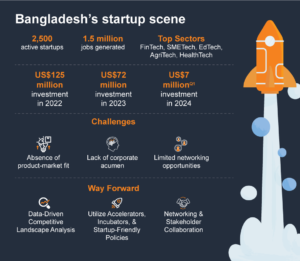
Even a decade ago, Bangladesh’s startup ecosystem was not as prospective as it has become in recent years. Bangladesh currently hosts 2,500 active startups, with an additional 200 entering the market annually. This data speaks volumes about the untapped market potential and signals its increasing prominence on the global stage as an attractive destination for investment and innovation. With increasing global recognition, Bangladesh’s startup sector has already generated over 1.5 million jobs, significantly mitigating the country’s unemployment crisis, with a US$7 million startup fund injected in Q1 2024.
Now, many market professionals are identifying Bangladesh as the upcoming goldmine for startups, however, is this the true reflection of reality? With such a surge and zeal for launching new startup businesses, why are many of them failing at the initial stage and disappearing from the market? Innovision published a series of in-house publications focusing on the sectors receiving the highest funding, including FinTech, SME Tech, EdTech, AgriTech, and HealthTech. We have found that popular startup companies are hanging on by a thread even after operating in the market for more than a decade. This phenomenon can be attributed to three primary factors.
Firstly, the absence of product-market fit stands out prominently. Such a situation arises when the offered product or service fails to meet the demands or desires of the intended audience. This mismatch can stem from factors such as a lack of understanding of the target market and incorrect assumptions about customer preferences. Additionally, a lack of corporate acumen and shallow business knowledge regarding the complexities of business management within a fiercely competitive market can misguide founders, especially when they fail to comprehend the market size, customer segmentation and targeting techniques, supply chain, and pricing strategies. Every year 70%-80% of startups fail due to these major reasons. Lastly, limited networking opportunities and funding constraints serve as significant barriers, hindering the flourishing of startup ideas and their transformation into lucrative businesses before attaining the status of cash cows.

One other key area that Bangladesh’s startup ecosystem also suffers from is bureaucratic hurdles and from the absence of startup-specific regulations which impedes their further growth. In some cases, tax and VAT regulations for start-up companies are quite rigid, although only tech companies had income tax exemptions as per Income Tax 2021. It is now up for debate if this tax exemption will continue in the future since NBR has decided to halt this exemption period in this upcoming July 2024. This includes a probable decline in investment levels and diminished returns in the software industry, highlighting the critical importance of regulatory stability for fostering industry growth and sustainability. Experts are expecting a loss of $1 billion in investment if the tax exemption policy is revoked in 2024.
So, now the question arises as to how startup founders should strategize their action plans to sustain in this competitive market?
While all these challenges persist, Bangladesh still has a great prospect of fueling the startup scene in the upcoming years if appropriate strategies are adopted. This growth trajectory puts Bangladesh’s name as an increasingly significant player in the global startup territory, drawing the attention of many venture capitalists and investors.
Moving forward, the key is for government organizations and the private sector to work together actively. By introducing policies that support startup founders, it is possible to accelerate their growth and ensure the sustainability of the ecosystem.
The absence of product market fit can be strategized by conducting market research and by identifying specific customer segments or niches within the target market and catering to the needs of the consumers. The business knowledge gap among entrepreneurs can be mitigated by introducing more government-backed and private sector accelerators and innovator programs to further train entrepreneurs. Finally, the idea is to organize startup events and conferences to create a platform where global investors and entrepreneurs can come together, interact, and establish connections. By bringing key stakeholders together in one place, these events facilitate knowledge sharing, collaboration, and investment opportunities, ultimately fostering growth and innovation within the startup ecosystem.
Favorable government policies are also required as most successful ecosystems have leveraged supportive regulations. For instance, tax rebate on profit during the initial years of a rising startup should be introduced, easing burden on new startups. Introducing frameworks for easy exit can also provide foreign investors to participate more in investing and this can help battle the dollar crisis as well. Such initiatives can boost the growth and better yet sustain the startup ecosystem in a systematic manner.
The startup ecosystem in Bangladesh signifies not a fleeting trend, but the onset of a profound and enduring transformation. For perceptive investors, Bangladesh represents a canvas brimming with promise and potential. With the implementation of government-backed policies and strategic initiatives, this untapped potential can unlock a vast gateway to economic growth for the nation.
Contributors: Fahmida Faruque and Soumik Siddique Plaban from Data Analytics & Emerging Frontiers Portfolio at Innovision Consulting.